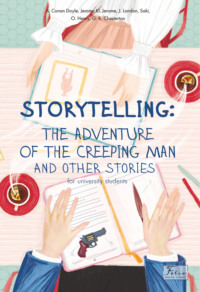
Storytelling. The adventure of the creeping man and other stories
“What do you dream about?” asked Taverner.
“All sorts of things; nothing especially nightmary.”
“Do you notice any kind of family likeness in your dreams?”
“Now you come to mention it, I do. They all take place in brilliant sunshine. They aren’t exactly Oriental, but that way inclined.”
Taverner laid before him a book of Egyptian travel illustrated in watercolours.
“Anything like that?” he inquired.
“My hat!” exclaimed the man. “That’s the very thing.” He gazed eagerly at the pictures, and then suddenly thrust the book away from him. “I can’t look at them,” he said; “It makes me feel – ” he laid his hand on his solar plexus, hunting for a simile – “as if my tummy had dropped out.”
Taverner asked our patient a few more questions, and then dismissed him with instructions to report himself if any further developments took place, saying that it was impossible to treat his trouble in its present phase. From my knowledge of Taverner’s ways I knew that this meant that he required time to carry out a psychic examination of the case, which was his peculiar art, for he used his trained intuition to explore the minds of his patients as another man might use a microscope to examine the tissues of their bodies.
As it was a Friday afternoon, and Black was our last patient, I found myself free after his departure, and was walking down Harley Street wondering how I should dispose of my weekend, for an invitation I had counted upon had unexpectedly failed me. As I took a short cut through a mews lying behind the house I saw Black manoeuvring a car out of a garage. He saw me, too, and hailed me as a friend.
“You wouldn’t care for a joy ride, I suppose? I am off on the trail again.
Like to join me in running down the fair unknown?”
He spoke lightly, but I had had a glimpse of his soul, and knew what lay beneath. I accepted his offer, to his evident pleasure; he filled the gap left by the defection of my friends, and, moreover, I should learn more by accompanying him on one of his journeys than a dozen consulting-room examinations would tell me.
Never shall I forget that drive. He behaved normally till we got clear of the outlying suburbs, and then as dusk began to fall a change came over the man. At a secluded spot in the road he halted the car and stopped the engine. In the perfect stillness of that spring evening we listened to the silence. Then Black rose up in the driving-seat and uttered a peculiar cry; it was upon three minor notes, like a birdcall.
“What did you do that for?” I asked him.
“I dunno,” he said; “it might attract her attention. You never know. It’s not worth missing a chance, anyway.”
He restarted the car, and I realized that the quest had begun in good earnest. I watched the needle of the speedometer creeping round the dial as we hurtled into the gathering dusk.
The hedges fell away on either side of us in a grey blur. Towns and villages passed us with a roar, their inhabitants luckily keeping out of our path. Gradients we took in our stride, and dropped into valleys like a stone from a sling. Presently from the top of a crest, we felt the Channel wind in our faces. Black hurled the car down a hill like the side of a house and pulled up dead, the bonnet nosing against promenade railings.
Ahead lay the sea. Nothing else, I am convinced, could have stopped our career. Black stared at the surf for a few moments; then he shook his head.
“I have missed her again,” he said, and backed the car off the pavement.
“I got nearer to her tonight than I have ever done, though.”
We put up for the night at an hotel, and next day Black drove me back again. I stipulated that we should get in before dusk. I had no wish to accompany him in pursuit of his dream again.
On my return I reported my experience to Taverner.
“It is an interesting case,” he said, “and I think it will furnish a remarkably good instance of my reincarnation theory.”
I knew Taverner’s belief that the soul has lived many lives before the present one, and that the experiences of those lives go to make up the character of today. When confronted by a mental state for which he could find no adequate cause in the present, it was his custom to investigate the past, getting the record of the previous lives of his patient by those secret means of which he was master. During the early days of my association with Taverner I considered these records imaginary, but when I saw how Taverner, working upon this idea, was able to foretell not only what a person would do, but in what circumstances he would find himself, I began to see that in this curious old theory of the East we might find the key to much of the baffling mystery of human life.
Конец ознакомительного фрагмента.
Текст предоставлен ООО «ЛитРес».
Прочитайте эту книгу целиком, купив полную легальную версию на ЛитРес.
Безопасно оплатить книгу можно банковской картой Visa, MasterCard, Maestro, со счета мобильного телефона, с платежного терминала, в салоне МТС или Связной, через PayPal, WebMoney, Яндекс.Деньги, QIWI Кошелек, бонусными картами или другим удобным Вам способом.
Вы ознакомились с фрагментом книги.
Для бесплатного чтения открыта только часть текста.
Приобретайте полный текст книги у нашего партнера:
Полная версия книги
